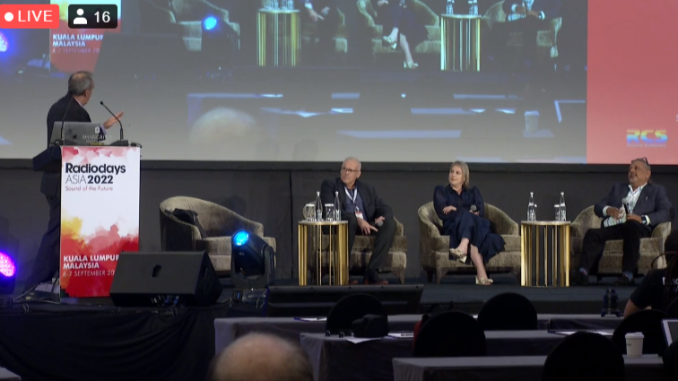
Talent recruitment has become harder due to increased competition from competitors poaching staff and social media providing a new avenue for people to build their personality profiles. There is now more competition for talent and wages. How are radio broadcasters coping and what strategies are they using to find and hold new talent? Steve Ahern, Head of ABU Media Academy led a panel discussion called ‘The Tussle for Talent’ with radio leaders to discover the extent of the problem and what they are doing about it.
The panel included Duncan Campbell, Chief Content Officer, ARN, Australia, Amanda Lee, Content Director – Melbourne’s 101.9 The Fox, SCA, Australia and Abe Thomas, CEO, Big FM, India.
Introducing the topic, Steve quoted the example of an anonymous employee who contacted Radio Today arguing for increased pay in an open letter to the industry. The reactions to it were polarized. Someone found it soul crushing to work really hard for perks which were few and far between and then hear that some people were earning obscene amounts of money, while someone else commented that if you don’t want to leave radio, you don’t need a six figure salary to “be comfortable”, learn what you can do with what you make.
Steve then discussed comments from Malek Ali, Proprietor, BFM, Kuala Lumpur on what does it mean for retaining talent, now that people have other options. Is it a problem?
Ali said: “Just the last few months, we have lost several people to other organisations seeking content creators. These are not media companies, just normal companies seeking content creator talent for their verticals. The only thing we can do is say it takes a team, not an individual, to create this great content, and then focus on our culture and environment to retain people. If an individual is motivated heavily by financial rewards and leave us, then we wish them well, but tell them to get back to us if anything changes.”
Amanda said: “Yes, there’s a lot of other opportunities and not having to do the kind of hours we do in radio is a factor.”
“You can make $40,000 a year with a YouTube channel as against $60,000 as a radio producer. You’ll stay in the business if you love it. It’s always been an issue,” said Duncan.
Abe spoke of two new phenomena he has noticed after the pandemic, when there were a lot of job cuts and it changed the way talent looks at work as they seek a better work-life balance. “Ghosting is when people just disappear after their first salary and become uncontactable. The other trend is ‘Quiet Quitting’, when people just do the bare basic minimum to keep their job, there is no effort to try to achieve anything more,” he said.
“In an industry with a shallow talent pool, it is our responsibility to help them develop talent,” said Duncan.
This story first appeared on RadioInfo.asia
